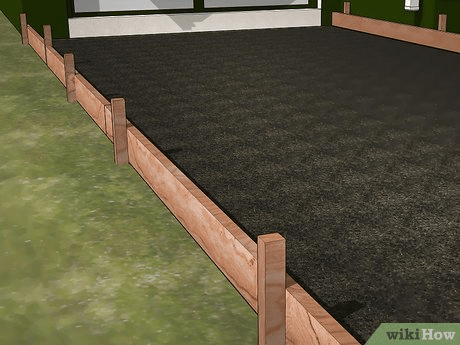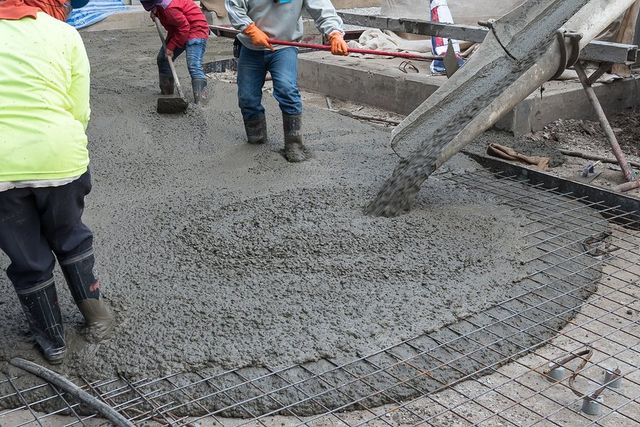How to build a concrete driveway
A concrete driveway can be constructed in a variety of ways. Myriad are the options available for building a driveway, depending on the number of factors involved, including the feasibility of your location and budget. As you peel back that last layer of sod and prepare to lay your new concrete driveway, you will want to take into consideration some of the following pros and cons before you get started.
Building a driveway is an arduous task. It will take a lot of your time and money, but it’s worth it in the end when you walk outside and see your finished project.

How to build a concrete Driveway
Concrete driveways are a great choice for your home. They’re low-maintenance and durable, which means they can stand up to the elements and last for many years. They’re also easy to install and don’t require any special tools or expertise.
With that said, there are some things you should know before starting your project. For example, what kind of concrete should you use? How do you prepare the ground? And what steps should you take after pouring the concrete?
Here are our tips for building a concrete driveway — plus some examples of different styles of driveway designs to help inspire your own ideas.
Concrete Driveway Pros and Cons
Pros: Concrete driveways have many advantages over other types of paving materials such as asphalt or pavers. They are strong, durable and low-maintenance — perfect for busy families who don’t have time or energy to spend on their outdoor space every week. They also look beautiful with many different color options available from paler tones to darker hues.
Cons: The biggest downside is that concrete driveways cost more than most other materials but if you’re looking for a long-term investment that will last decades without requiring much maintenance then this isn
Concrete is a popular choice for driveways because of its durability and low maintenance. However, it’s not always the best option. If you live in a very cold climate, you may want to consider a different material that won’t crack under pressure.
There are several things to consider when deciding whether to build your driveway out of concrete or asphalt. Here are some pros and cons of each material:
Concrete Pros:
Durable. Concrete lasts longer than asphalt and can withstand extreme weather conditions such as ice, snow and high winds without cracking or potholes forming in the middle of your driveway. This makes it a great option for people who live in areas with extreme weather patterns such as hurricanes or tornadoes.
Low Maintenance. Concrete doesn’t need much maintenance once it has been poured, which is why many people prefer it over asphalt for their driveways. You’ll still have to sweep up leaves and debris from time to time, but you won’t have to worry about repairing cracks or damaged areas after heavy rains or snowstorms unless there was a problem with your original installation process (which should be covered under warranty).
Color Options. Concrete comes in a wide variety of colors — even custom colors if you want them! This makes
Building a driveway can be a great way to add value and beauty to your home. However, there are many factors to consider when deciding whether or not to build your own concrete driveway. Here are some of the pros and cons of building your own concrete driveway:
Pros:
1. Concrete is durable and long-lasting.
2. You have control over the color, texture and pattern of the surface.
3. A concrete slab gives you more flexibility in the size and shape of your driveway than pouring asphalt (which must conform to certain specifications).
4. Concrete is less expensive than asphalt because it doesn’t require special equipment or maintenance (such as sealing).

1. The cost of materials can add up quickly if you’re doing it yourself (see below for costs).
2. Concrete takes longer to set up than asphalt does, so you may need help from someone who has experience laying concrete slabs before beginning this project yourself.
Concrete is not only an affordable option for driveways, but it also offers a variety of advantages. It can be used to form curbs, sidewalks and even patios. The cost of concrete will vary based on the size and design of your driveway.
Asphalt is another popular choice for driveway material because it’s cheap and easy to install. However, asphalt doesn’t last as long as concrete and requires more maintenance over time.
When choosing between these two materials, consider their pros and cons:

Long-lasting – Concrete is a sturdy material that can last 50 years or longer when properly maintained. A properly installed concrete driveway will stay flat with minimal cracking over time.
Durable – Concrete won’t fade in sunlight like asphalt does; it holds up well under extreme weather conditions (hot or cold).
Dirt-resistant – Concrete isn’t prone to potholes like asphalt because dirt doesn’t sink into the surface as easily as it does with asphalt. You also don’t need to worry about algae growth like you do with an asphalt driveway.
The most common material used to build a driveway is concrete. It can be poured in one of two ways: slab-on-grade or post-and-beam. The former is the more traditional approach, but the latter is gaining popularity because it allows for greater design flexibility and easier installation.
Slab-on-grade construction begins with a layer of compacted gravel or crushed stone that serves as a base for the concrete slab. A skid layer made of wood or plastic is laid on top of this base and provides a smooth surface for heavy equipment during construction and delivery. Next, rebar is placed in pockets within the gravel base along with posts called forms. The forms are then filled with concrete, which hardens over time into a solid mass.
Post-and-beam construction uses two parallel rows of vertical posts set into prepared trenches in the ground (or set directly in concrete). Each pair of posts supports a horizontal beam that forms the top surface of the driveway; these beams are connected by cross beams above ground level. A layer of compacted gravel or crushed stone fills in between these beams before they’re covered with asphalt
Homeowners who are considering building a concrete driveway have a lot to consider, from the cost and time it takes to build, to the pros and cons of this type of driveway.
Here are some things you should know before you start thinking about building a concrete driveway:
Cost: The cost of building a concrete driveway varies depending on the size and complexity of your project. For example, a simple slab will cost less than one with edging, curbing or decorative details. You can expect to pay anywhere from $3 per square foot to $12 per square foot.
Time: A standard-size slab takes about two days to pour and set up, but larger slabs can take up to six days for full curing time. A curb-and-gutter system takes two days for pouring and setting up, plus at least three weeks for curing time. The entire process can take as long as six months or more if there are complications during construction or if bad weather slows progress down.
Concrete Driveways Pros and Cons
There are many benefits of concrete driveways. They come in a wide range of colors and styles, so you can create an elaborate design or a simple, functional driveway. Concrete is very durable, which makes it a good choice for busy households. It can be made smooth enough to prevent injuries when someone trips on it, but rough enough to grip tires and prevent skidding during icy weather.
Pros:
Durability. Concrete driveways last longer than most other types of pavement. They can last 50 years or more if they are properly maintained and sealed annually. Concrete also resists cracking and breaking when subjected to heavy traffic or extreme weather conditions like heavy rain, snow or ice storms.
Safety features. Rubberized concrete contains sand that creates friction between tires and the ground when they’re turning. This reduces the risk of slipping off the road during inclement weather conditions like rain or snow storms. Larger stones called aggregate give concrete its strength and durability, but there are some with no aggregate at all (called “fine-grades”). These types of concrete are better suited for driveways since they don’t need as much maintenance as those that contain large pieces of aggregate.
A concrete driveway is an investment that can last for decades. It’s important to know the pros and cons of this material before you make your decision. A concrete driveway is an investment that can last for decades. It’s important to know the pros and cons of this material before you make your decision.
Concrete driveways have a few distinct advantages over asphalt ones:
They’re durable, meaning they’ll last longer than asphalt driveways do. Concrete may crack or chip over time, but it lasts much longer than asphalt does.
They’re more economical than other types of driveways because they cost less to install and maintain over time. Concrete is relatively inexpensive compared to other materials for driveway construction, such as asphalt or gravel. You may also save money by avoiding paying for repairs on your asphalt or gravel driveway every few years because these materials tend to wear out more quickly than concrete does under pressure from vehicles driving over them (though this depends on how well maintained your driveway is).
Concrete driveways don’t need sealing every year like some other surfaces do; however, if you live in a rainy climate or if there’s excessive water runoff from nearby hillsides where water collects after heavy rains (this happens in many areas), you may want to seal the surface
Concrete driveways are a popular choice for homeowners throughout the country. They’re durable, affordable and easy to install in just about any type of terrain.
Concrete is ideal for areas that receive heavy foot traffic, such as driveways and sidewalks. When properly sealed, a concrete driveway can last for decades with only minimal maintenance.
Concrete requires a lot of time and effort to install correctly. If you don’t have the experience or tools required to lay down a solid base, consider hiring an experienced contractor to do the job for you.
Here’s how to build a driveway
Excavate the area where you want to install your driveway. Make sure it’s level by using stakes and string lines to mark off where the edges will be located. Excavate until you reach natural subsoil; this will provide drainage for rainwater runoff and help prevent cracks in your new driveway later on down the road.
Dig out any large rocks or obstructions from your site before moving on to step three below!
Concrete is a very durable and long lasting material, but it’s not the best choice for every home. It’s expensive, can crack over time and requires significant maintenance.
Concrete driveways have their pros and cons just like any other material. The biggest benefit of concrete is its durability. Concrete is made of a combination of sand, gravel and cement which makes it a very solid base for your driveway.
This sturdiness makes concrete a good option if you have heavy traffic on your driveway or live in an area with harsh winters where snowplows often pass through.
The biggest downside to concrete is that it can crack over time due to temperature changes, vehicle weight and other factors that affect the soil below your driveway. This can make it difficult to repair once cracks form and you may need to replace large sections of concrete entirely instead of just filling in small gaps or cracks with another material like asphalt or tar-based sealer.